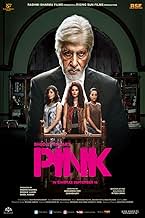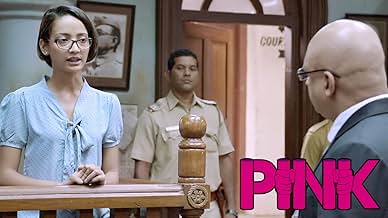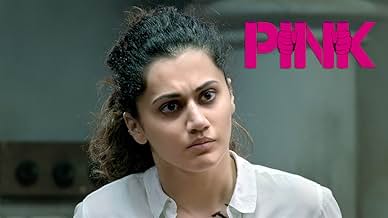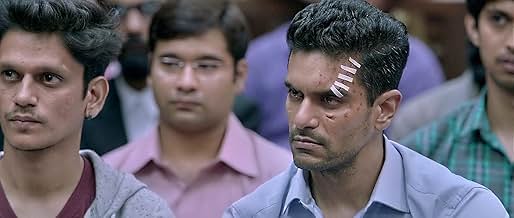NOTE IMDb
8,0/10
49 k
MA NOTE
Ajouter une intrigue dans votre langueWhen three young women are implicated in a crime, a retired lawyer steps forward to help them clear their names.When three young women are implicated in a crime, a retired lawyer steps forward to help them clear their names.When three young women are implicated in a crime, a retired lawyer steps forward to help them clear their names.
- Récompenses
- 21 victoires et 39 nominations au total
Arjun Chakrabarty
- Ritwik
- (as Arjun Chakraborty)
Histoire
Le saviez-vous
- AnecdotesAmitabh Bachchan suggested that his name should be in the credits after the 3 leading ladies in order to show the importance of gender equality, which is what the movie is based on. As a result, in the introductory and end credits, the three lead actresses lead the credits before Amitabh Bachchan. Generally, due to the veteran actor's seniority, it would have been him leading the credits.
- GaffesWhen Tapsee Pannu goes to jog in the park for the first time she had earbuds in both her ears and she stops for stretching when we see her from Amitabh Bachchan's POV she had earbud only in her left ear but when we see Amitabh Bachchan in the same shot in Objective Shot with Tapsee Pannu in Foreground she had earbuds in both her ears.
- Citations
Deepak Sehgal: 'No' means no and when someone says No, you stop.
- Crédits fousDuring the end credits, the initial harassment scene of the film (not shown by then) appear.
- ConnexionsFeatured in 62nd Jio Filmfare Awards (2017)
- Bandes originalesPink (Title Track)
Lyrics written by Irshad Kamil
Music composed by Anupam Roy
Sung by Jonita Gandhi with rap written and sung by Santhanam Srinivasan Iyer ( aka EPR Iyer)
Arranged and Performed by Kuntal De
Musicians: Kishore Sodha (Trumpet), Rhythm Shaw (Guitar)
Mix & Mastered by Chatterjee Shommi
Commentaire à la une
Pink (2016)
"No. No, your honor. 'No' is not a word. It is a complete sentence. It doesn't need any further explanation. 'No' simply means 'no'. My client said no', your honor and these boys must realize that 'no' means 'no' whether the girl is an acquaintance, a friend, girlfriend, or a sex worker. Or even your own wife! 'No' means no'! I want someone says so, you stop."
The Good: * Makes important statements regarding social issues includes consent, double standards for females and males, inherent biases, molestation, misogyny, rape, self defense, social strata, and violence against women. This is especially relevant in India, where rapes often go unreported for to fear of public shame and possibly (as portrayed in the film) having it backfire. It is still frowned upon by some for a girl to be independent, outspoken, willful, or to drink or go anywhere in private with a male. * Amitabh Bachchan, due to his seniority, was originally first listed in the credits. However, to show gender equality, he requested to have his name listed after the three leading ladies. It is great to know that the actor was as passionate about gender quality as his character was in the film. * A clever creative choice was showing the scene of what actually happened that night, in slow motion, during the credits. Be sure to wait for that.
The Bad: * Great acting overall by the three leading ladies, but they were quite melodramatic. It alternated between an impressive performance and a performance completely overdone. * Bachchan may have had a powerful presence, but he was also creepy. Whatever the reasons, his breathing mask, combined with his mysterious demeanor and harsh voice, made for more of a creepy presence. Add to that the angles that made his eyes look white in many scenes, he was straight up scary. Supposedly he had bipolar, but I do not even know why that was a detail.
The Ugly: * Unrealistic portrayal of a court debate. These lawyers would not be a allowed to intimidate and yell at the witnesses on the stand, practically coercing them into a false confession. Likewise, they would not be allowed to preach on topics irrelevant to the case. The case becomes a stage for feminism, narrated by Bachchan. * Makes important points, but crosses the line very early on into preaching. To the point that I might call this propaganda. * Unrealistic to the point that I could not take it seriously and became bored in the second hour of this unnecessarily long film.
Conclusion: Many memorable lines, overall good performances,, made a valuable case for many important social issues; but excessive in length, portrayed court cases unrealistically, and it became preaching (practically) propaganda.
"No. No, your honor. 'No' is not a word. It is a complete sentence. It doesn't need any further explanation. 'No' simply means 'no'. My client said no', your honor and these boys must realize that 'no' means 'no' whether the girl is an acquaintance, a friend, girlfriend, or a sex worker. Or even your own wife! 'No' means no'! I want someone says so, you stop."
The Good: * Makes important statements regarding social issues includes consent, double standards for females and males, inherent biases, molestation, misogyny, rape, self defense, social strata, and violence against women. This is especially relevant in India, where rapes often go unreported for to fear of public shame and possibly (as portrayed in the film) having it backfire. It is still frowned upon by some for a girl to be independent, outspoken, willful, or to drink or go anywhere in private with a male. * Amitabh Bachchan, due to his seniority, was originally first listed in the credits. However, to show gender equality, he requested to have his name listed after the three leading ladies. It is great to know that the actor was as passionate about gender quality as his character was in the film. * A clever creative choice was showing the scene of what actually happened that night, in slow motion, during the credits. Be sure to wait for that.
The Bad: * Great acting overall by the three leading ladies, but they were quite melodramatic. It alternated between an impressive performance and a performance completely overdone. * Bachchan may have had a powerful presence, but he was also creepy. Whatever the reasons, his breathing mask, combined with his mysterious demeanor and harsh voice, made for more of a creepy presence. Add to that the angles that made his eyes look white in many scenes, he was straight up scary. Supposedly he had bipolar, but I do not even know why that was a detail.
The Ugly: * Unrealistic portrayal of a court debate. These lawyers would not be a allowed to intimidate and yell at the witnesses on the stand, practically coercing them into a false confession. Likewise, they would not be allowed to preach on topics irrelevant to the case. The case becomes a stage for feminism, narrated by Bachchan. * Makes important points, but crosses the line very early on into preaching. To the point that I might call this propaganda. * Unrealistic to the point that I could not take it seriously and became bored in the second hour of this unnecessarily long film.
Conclusion: Many memorable lines, overall good performances,, made a valuable case for many important social issues; but excessive in length, portrayed court cases unrealistically, and it became preaching (practically) propaganda.
- ASuiGeneris
- 9 janv. 2018
- Permalien
Meilleurs choix
Connectez-vous pour évaluer et suivre la liste de favoris afin de recevoir des recommandations personnalisées
- How long is Pink?Alimenté par Alexa
Détails
Box-office
- Montant brut mondial
- 180 180 $US
- Durée2 heures 16 minutes
- Rapport de forme
- 2.35 : 1
Contribuer à cette page
Suggérer une modification ou ajouter du contenu manquant





































